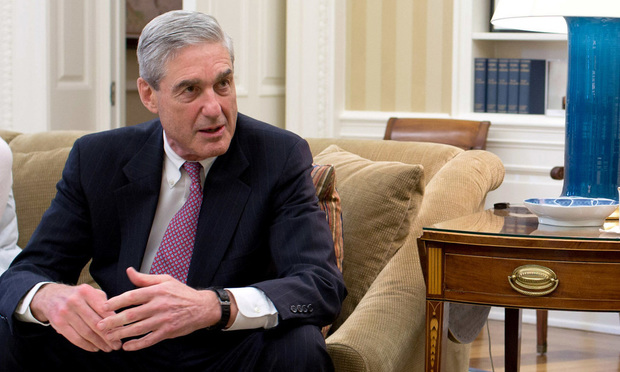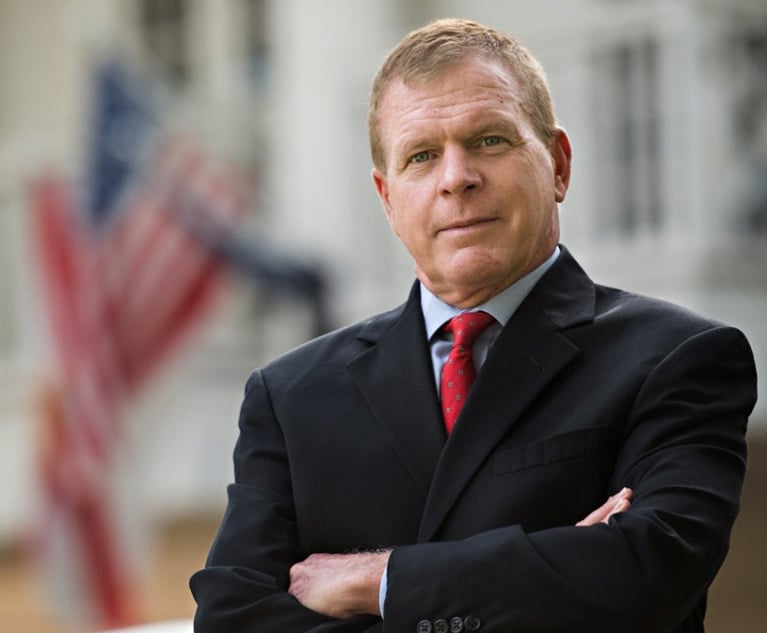Can Lawyers Represent Hostile Foreign Governments Charged in the Mueller Probe?
The Mueller investigation has highlighted some of the potential problems for lawyers who choose to represent hostile foreign governments or individuals and entities connected with those governments.
January 11, 2019 at 10:58 AM
5 minute read
The original version of this story was published on New York Law Journal
 Robert Mueller. Photo: White House/Pete Souza
Robert Mueller. Photo: White House/Pete Souza
The obvious answer to this question is yes. Even the most despised client deserves representation. This is especially true in criminal cases. The ethical rules make it clear that lawyers are not morally accountable for the actions of their clients. This is so that even unpopular litigants can find representation. But the question is more complicated when the client is an individual or entity controlled by a hostile foreign government.
The Mueller investigation has highlighted some of the potential problems for lawyers who choose to represent hostile foreign governments or individuals and entities connected with those governments.
A court recently scolded lawyers from Reed Smith for their conduct in representing Concord Management and Consulting LLC, a Russian consulting firm indicted by Special Counsel Robert Mueller. In the course of defending their client, the lawyers attacked the special counsel, the media and the court. The court, echoed by the press and other observers, criticized the lawyers as both unprofessional and ineffective. The court and critics may be right that this strategy is ineffective if Concord's goal is to minimize criminal exposure.
But Concord is unlikely to suffer the consequences of the criminal case. Certainly, no individual connected with the company will end up in court. It's hard to know what the client has instructed its lawyers. Concord may, however, have no interest in “winning” the case. The sole interest may be in using the criminal case to destabilize American institutions. If that is the client's goal then the lawyers may, in fact, have been quite effective.
But assuming that is the case, is it ethical for lawyers to try to undermine American institutions on behalf of a client? In the Chicago 7 trial in 1969, William Kunstler and Leonard Weinglass represented defendants accused of inciting riots in connection with anti-Vietnam war protests.
During the course of the trial, some of the lawyers and clients tried to disrupt the proceedings, using the trial as a means of political protest. The goal was, in part, to criticize and mock American institutions to promote change. Most lawyers and ethics experts would say that this kind of behavior was permissible. The Chicago 7 had a lawful goal and the lawyers helped their clients achieve it.
But the Concord case is, at least arguably, different. Unlike the Chicago 7, Concord is a foreign client whose goal is not to promote a competing vision for America as a means to improve the country and help it live up to its aspirations. Its goal may be to use the court proceedings to undermine American interests by destabilizing its institutions.
Every lawyer takes an oath to uphold the American constitution. Given that oath, a client's goal to undermine the American legal system may not be a legitimate one, and the lawyers are not free as they would normally be to help their client pursue it. Even if the goal is lawful, it is at the very least problematic since lawyers are supposed to promote not undermine the administration of justice.
Lawyers have represented accused terrorists who choose not to legitimate the proceedings by refusing to participate and no one doubts the propriety of those lawyers' conduct. But that is different from actively assisting a client who faces no criminal consequences in a sustained effort to sow discord in the American courts.
In other cases related to the Mueller investigation, lawyers have been involved in representing foreign entities. Lawyers from Skadden, Arps, Meagher, Slate & Flom, for instance, produced a report that was used to help support the prosecution of Yulia Tymoshenko, the political opponent of the Ukraine's then pro-Russia president Viktor Yanukovych. The firm reportedly expressed reservations prior to issuing the report, stating in an email that there is virtually no evidence that Tymoshenko possessed the necessary criminal intent. Based on the information in the public record, this report seems ethically dubious.
To lend your professional reputation to what seems by all accounts a purely political foreign prosecution of an innocent person could be seen as assisting in criminal or fraudulent conduct. Even if the client's conduct is not illegal, it is certainly problematic for a lawyer to assist a country in undermining rather than promoting justice.
There are other cases, no doubt, in which lawyers are ethically representing the interests of hostile foreign countries, entities, and individuals. But these lawyers ought to be careful because their clients' interests may reach beyond the individual representation. They may be seeking to use their lawyers to pursue unlawful or ethically problematic goals. In any representation, there is a risk that a client may manipulate the lawyer, using the lawyer for nefarious ends. But this risk is greater when the country is hostile to our own. There are landmines that the lawyers must avoid. Mueller apparently referred the lawyers from Skadden to the US Attorney's office in Manhattan for further investigation.
Even if no lawyer is charged in connection with that case, they are closer to criminal exposure than any lawyer ought to be. Remaining ignorant about their clients' broader purposes won't necessarily save lawyers in this context so they ought to be diligent and careful to avoid these potential pitfalls.
The American democratic system is under attack on multiple fronts. This attack has highlighted the importance of the rule of law, independent courts and the professionals who uphold these legal institutions. In this climate, lawyers should be particularly careful not to betray this critical role.
Rebecca Roiphe is a New York Law School professor who teaches professional ethics and criminal law. She is a former prosecutor in the Manhattan DA's office and an expert on legal ethics.
This content has been archived. It is available through our partners, LexisNexis® and Bloomberg Law.
To view this content, please continue to their sites.
Not a Lexis Subscriber?
Subscribe Now
Not a Bloomberg Law Subscriber?
Subscribe Now
NOT FOR REPRINT
© 2025 ALM Global, LLC, All Rights Reserved. Request academic re-use from www.copyright.com. All other uses, submit a request to [email protected]. For more information visit Asset & Logo Licensing.
You Might Like
View All

Restoring Antitrust: Returning to the Consumer Welfare Standard

New York Mayor Adams Attacks Fed Prosecutor's Independence, Appeals to Trump
5 minute read
Trending Stories
- 1Two Wilkinson Stekloff Associates Among Victims of DC Plane Crash
- 2Two More Victims Alleged in New Sean Combs Sex Trafficking Indictment
- 3Jackson Lewis Leaders Discuss Firm's Innovation Efforts, From Prompt-a-Thons to Gen AI Pilots
- 4Trump's DOJ Files Lawsuit Seeking to Block $14B Tech Merger
- 5'No Retributive Actions,' Kash Patel Pledges if Confirmed to FBI
Who Got The Work
J. Brugh Lower of Gibbons has entered an appearance for industrial equipment supplier Devco Corporation in a pending trademark infringement lawsuit. The suit, accusing the defendant of selling knock-off Graco products, was filed Dec. 18 in New Jersey District Court by Rivkin Radler on behalf of Graco Inc. and Graco Minnesota. The case, assigned to U.S. District Judge Zahid N. Quraishi, is 3:24-cv-11294, Graco Inc. et al v. Devco Corporation.
Who Got The Work
Rebecca Maller-Stein and Kent A. Yalowitz of Arnold & Porter Kaye Scholer have entered their appearances for Hanaco Venture Capital and its executives, Lior Prosor and David Frankel, in a pending securities lawsuit. The action, filed on Dec. 24 in New York Southern District Court by Zell, Aron & Co. on behalf of Goldeneye Advisors, accuses the defendants of negligently and fraudulently managing the plaintiff's $1 million investment. The case, assigned to U.S. District Judge Vernon S. Broderick, is 1:24-cv-09918, Goldeneye Advisors, LLC v. Hanaco Venture Capital, Ltd. et al.
Who Got The Work
Attorneys from A&O Shearman has stepped in as defense counsel for Toronto-Dominion Bank and other defendants in a pending securities class action. The suit, filed Dec. 11 in New York Southern District Court by Bleichmar Fonti & Auld, accuses the defendants of concealing the bank's 'pervasive' deficiencies in regards to its compliance with the Bank Secrecy Act and the quality of its anti-money laundering controls. The case, assigned to U.S. District Judge Arun Subramanian, is 1:24-cv-09445, Gonzalez v. The Toronto-Dominion Bank et al.
Who Got The Work
Crown Castle International, a Pennsylvania company providing shared communications infrastructure, has turned to Luke D. Wolf of Gordon Rees Scully Mansukhani to fend off a pending breach-of-contract lawsuit. The court action, filed Nov. 25 in Michigan Eastern District Court by Hooper Hathaway PC on behalf of The Town Residences LLC, accuses Crown Castle of failing to transfer approximately $30,000 in utility payments from T-Mobile in breach of a roof-top lease and assignment agreement. The case, assigned to U.S. District Judge Susan K. Declercq, is 2:24-cv-13131, The Town Residences LLC v. T-Mobile US, Inc. et al.
Who Got The Work
Wilfred P. Coronato and Daniel M. Schwartz of McCarter & English have stepped in as defense counsel to Electrolux Home Products Inc. in a pending product liability lawsuit. The court action, filed Nov. 26 in New York Eastern District Court by Poulos Lopiccolo PC and Nagel Rice LLP on behalf of David Stern, alleges that the defendant's refrigerators’ drawers and shelving repeatedly break and fall apart within months after purchase. The case, assigned to U.S. District Judge Joan M. Azrack, is 2:24-cv-08204, Stern v. Electrolux Home Products, Inc.
Featured Firms
Law Offices of Gary Martin Hays & Associates, P.C.
(470) 294-1674
Law Offices of Mark E. Salomone
(857) 444-6468
Smith & Hassler
(713) 739-1250








